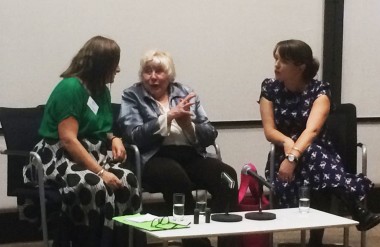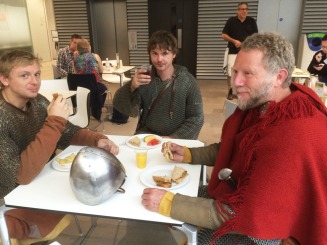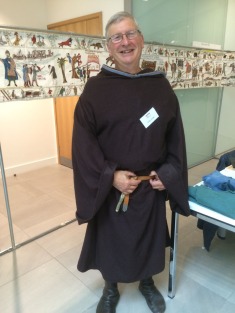Friday 2nd September saw me clambering on a train headed for Oxford, and my first Historical Novel Society Conference. This was my third writing-related conference this year (first Scottish Association of Writers, then Romantic Novelists’ Association), and I was not at all sure what to expect or whether I would be wasting my time.
Held in the modern and well-appointed Andrew Wiles building, which houses Oxford University’s Mathematical Institute, I quickly discovered I knew a great many writers there, and made a number of new friends.

Fay Weldon (centre), with sessions chair Carol McGrath (left) and author Jo Baker.
We were thrown straight into proceedings with a panel discussion between Jo Baker and the inimitable Fay Weldon. The following day Lord Melvyn Bragg delivered an excellent keynote speech centred on his novel, Now is the Time. And on Sunday, we were treated to a delightfully self-deprecating speech by one of my favourite novelists, Tracy Chevalier.
To add to the mix were panel discussions by agents, publishers, booksellers and writers, hands-on sessions (such as how to build a shield wall) and workshops and, as ever with conferences, the stimulus and pleasure of chewing everything over with like-minded people afterwards. Oh – and the delight of chatting with three handsome men, eating sandwiches … in chain mail and helmets.
A number of themes rose to the surface time and again:
- The future of historical fiction (the reported comment of one bookseller that ‘If it’s not Tudor or Roman, we’re not interested’ shocked many in the audience)
- The view that critics and some readers regard historical fiction as ‘genre’ and therefore by definition inferior to ‘literary fiction’
- Comments about covers – possibly too generic, but booksellers feel comfortable with products that look like something that has sold well before
- The difficulty of writing dialogue that doesn’t sound either modern or artificially ‘historic’
- The importance of weeding out anachronisms
There were tips galore. Here’s a random selection:
- Fay Weldon: Ask yourself, ‘what’s your book about?’
- Jane Johnson, Publishing Director at Harper Collins: ‘Write what’s in your heart – you can’t write to the market.’
- Manda Scott: ‘The paranoid anachronism hunt is a key part of historical writing.’
- Jean Fullerton: ‘Good historical fiction isn’t about the history, it’s about the people.’
- Jenny Barden: Use The Museum of Early Modern London (MoEML) for digitised period maps of the capital.
Apologies for not having space to quote the many other speakers who also offered great tips. I couldn’t be everywhere at once … unless, of course, I’d been able to travel through time. Which brings me to the last workshop I attended, on writing time-slip/time travel novels.
Is time travel possible? Clearly, it’s not – so how can we make such novels work? Well, it turns out that we do this in exactly the same way as we write any other piece of fiction: by cleverly making our readers suspend their disbelief. And so, with a final dash through the corridors of the Andrew Wiles Building clutching my magic, time-transporting laptop, I’ll leave you with a few final gems:
- Julian Fellowes has not spoiled the upstairs/downstairs trope for all other writers (Fay Weldon/Jo Baker)
- The Peasants’ Revolt was neither by peasants nor was it a revolt (Melvyn Bragg)
- You need a sense of national crisis as a background for a good historical thriller (Manda Scott)
- Rory Clement: Anyone who thinks it’s an easy job is not putting enough effort in.’
- Use all five senses to make your backgrounds come to life (a tip offered by just about everybody)

‘Monk’ Chas James with his informative Battle of Fulford tapestry.
Next year the conference will be held in Portland, Oregon. It’s a long way to go, but quite a few American writers made it to Oxford. Up for a trip, anyone?

Reblogged this on Chicklit Sisters and commented:
Want to know what happens at the Historical Novel Society Conference? Jenny Harper fills us in on Take Five Authors blog
LikeLike
It sounds an inspirational weekend, Jenny. Hope your own writing project is going well… : )
LikeLiked by 1 person
Loving it, Rae, thank you!!
LikeLike
Really interesting account of the conference – thanks for sharing 🙂
LikeLiked by 1 person
My pleasure, Caroline. 🙂
LikeLike
That sounds like a lot of fun, even if the advice does sound contradictory. I’m not sure how you can write from the heart if it has to be Tudor or Roman. Ah well, back to the medieval drawing-board.
LikeLike
I think she was reputing the comment from booksellers. We were all a bit taken aback by it! Thanks for visiting our blog, April.
LikeLiked by 1 person
Could even have been ‘refuting’ it!! J 🙂
LikeLike
Agree. Sounds like a great conference. Thanks for the insight Jenny 🙂
LikeLike
It was nice meeting many Americans, too!
LikeLike
Goodness, Jenny, it sounds exhausting – but I imagine equally exciting and inspiring. Thanks for giving us a quick peek into the conference.
LikeLiked by 1 person
Tiring but fun, Mary!
LikeLike
Pingback: Historical fiction: alive and kicking in Oxford – Take Five Authors – Jenny Harper Author
I took loads of notes, Sue. Picking the best things to write about was hard!
LikeLiked by 1 person
Thank you for that whistle-stop tour of the HNS conference, Jenny. I’ve heard so many good things about it and I was fascinated by your account.
LikeLiked by 1 person